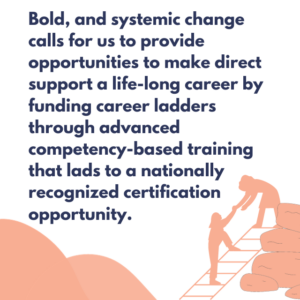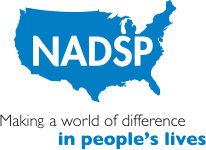
Recognizing Direct Support Professionals
A Note from NADSP President and CEO, Joseph M. Macbeth
First, I’d like to thank our nation’s direct support professionals for their commitment and dedication to people with disabilities. To be an effective direct support professional, one forges strong relationships with whom they work, while demonstrating complex skills and a commitment to professional ethics. Direct support is one of the most challenging yet rewarding professions in the country. It’s my wish that every direct support professional receives the due recognition they deserve during National Direct Support Professional Recognition Week and that we all take a moment to reflect on the incredible impact that direct support professionals have on the lives and personal outcomes of the people they support, especially over the past three years during the COVID pandemic.
As competition for workers across all industries grows stronger, establishing direct support professional wages that are competitive and commensurate with the expectations that are placed upon them must be our highest priority. Throughout the pandemic, human service organizations have found themselves steeped in crisis, struggling to find and keep these most valuable workers. As has been well documented, this “crisis” was predicted decades ago and still has not been addressed in any meaningful way to build a viable career option to which people are drawn and duly compensated. 
I have the honor of meeting thousands of direct support professionals each year, many of whom tell me that they feel a sense of deep personal satisfaction derived from helping another on their life’s journey. This is dignified and noble work that often requires direct support professionals to make personal sacrifices to provide the best support possible. However, over the course of the past three years, we’ve also heard stories of staggering hardship and met heads of households who work fulltime as direct support professionals who are unable to find safe and affordable housing. How can we, as a system, support people with disabilities well, when we don’t support those who provide direct services? We’ve talked this issue to death and it’s clear that our current strategies to build the workforce is not a sustainable option.
Bold, and systemic change calls for us to provide opportunities to make direct support a life-long career by funding career ladders through advanced competency-based training that leads to a nationally recognized certification opportunity. Each rung of that career ladder would reflect proficiency in complex work or specialty areas that are associated with the provision of quality direct support services and must be tied to salary increments. We do not have the luxury of time because so many are depending on us to finally get this right.
The American Rescue Plan Act (ARPA) funding that has been flowing into states to address the pandemic rebuilding was designed to provide short-term solutions, but let’s be clear, there are no short-term solutions that will adequately address the long-term systemic failure to invest in our workforce. We need long-term solutions to fulfill the promises made to people with disabilities and their families. All stakeholders must prioritize the direct support workforce crisis as its number one policy issue. Together, we must demand that policy makers on the federal and local levels address the financial underpinnings of the Medicaid and Medicare systems which provide for the wages and benefits of most staff who directly support the needs of people with disabilities.
To me, this is the true essence of Direct Support Professional Recognition Week. Please join me in celebrating your direct support professionals – this week and every week.

Joseph M. Macbeth
President and Chief Executive Officer
National Alliance for Direct Support Professionals
